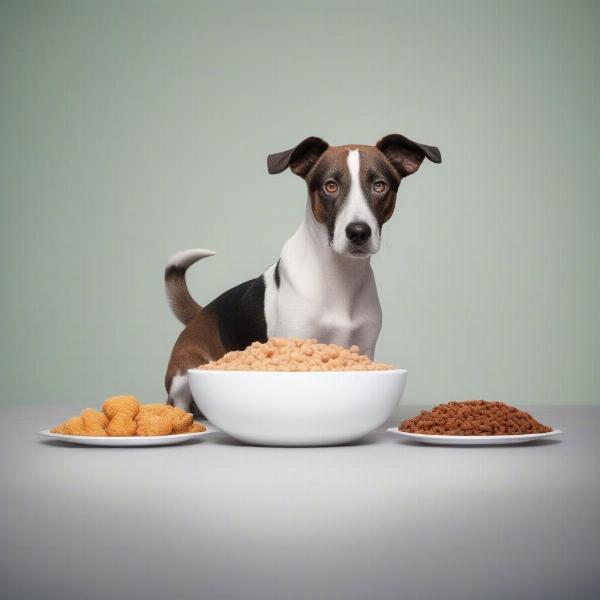Dogs fighting over food is a concerning behavior that can disrupt household harmony and even lead to injuries. Understanding why this happens and implementing effective strategies to address it is crucial for a peaceful multi-dog home. This guide explores the various reasons behind food aggression in dogs and provides practical solutions to manage and prevent it.
Understanding the Roots of Food Aggression
Several factors can contribute to dogs fighting over food. Dominance, resource guarding, scarcity mindset, past experiences, and even underlying medical conditions can all play a role. Identifying the root cause is the first step towards resolving this issue.
Dominance and Resource Guarding
In multi-dog households, a hierarchy often exists. One dog may perceive food as a high-value resource and feel the need to protect it from other dogs. This is known as resource guarding, which can manifest as growling, snapping, or even biting when another dog approaches their food.  Dominant dog guarding food
Dominant dog guarding food
Scarcity Mindset and Past Experiences
Dogs who have experienced food scarcity in the past, such as stray dogs or those from shelters, may develop a scarcity mindset. They believe that food is a limited resource and may become aggressive to ensure they get their share. Similarly, negative experiences surrounding mealtimes, such as being interrupted or having their food taken away, can also contribute to food aggression.
Medical Influences
In some cases, underlying medical conditions like pain or hormonal imbalances can trigger changes in behavior, including increased aggression around food. If your dog suddenly develops food aggression, a veterinary check-up is crucial to rule out any underlying medical issues.
Preventing Food Fights: Proactive Strategies
Preventing food fights is often easier and more effective than trying to address established aggression. Implementing a few key strategies can significantly reduce the likelihood of conflict during mealtimes.
Separate Feeding Areas
Providing each dog with their own designated feeding area, well-spaced apart, can minimize competition and create a sense of security. Ensure each dog has enough space to eat comfortably without feeling threatened by the presence of other dogs.
Establishing Clear Mealtime Rules
Consistency is key. Establish clear mealtime rules and stick to them. For example, feed the dogs at the same time each day in their designated spots. Do not allow them to wander or approach each other’s food bowls. sibling dogs fighting can often be addressed with proper feeding routines.
Supervision and Positive Reinforcement
Supervise mealtimes, especially when initially implementing these strategies. If any tension arises, calmly redirect the dogs and reinforce desired behavior with positive reinforcement, such as praise or a small treat. This helps create a positive association with mealtimes.
Managing Existing Food Aggression: A Step-by-Step Approach
If your dogs are already exhibiting food aggression, a more structured approach is needed. kelp seaweed powder for dogs may provide additional nutritional support and reduce stress related to food scarcity.
Gradual Desensitization and Counter-Conditioning
This involves gradually exposing the dogs to each other’s presence during mealtimes while pairing it with positive experiences. Start by feeding them far apart and gradually decrease the distance over time, rewarding calm and non-aggressive behavior. sibling rivalry in dogs can be mitigated with consistent training and positive reinforcement.
Professional Guidance
If the aggression is severe or you’re struggling to manage it on your own, seeking professional help from a certified dog trainer or veterinary behaviorist is highly recommended. They can assess the situation, develop a tailored behavior modification plan, and provide guidance on safe and effective training techniques. Understanding why do dogs fight is crucial for implementing the right training techniques. Learning about dog politics can also offer insights into canine social dynamics and hierarchy.
Conclusion
Dogs fighting over food is a manageable issue. By understanding the underlying causes, implementing preventative measures, and utilizing appropriate training techniques, you can create a peaceful and harmonious mealtime environment for all your canine companions. Remember, patience and consistency are key to success.
FAQ
- What should I do if my dogs start fighting over food? Immediately interrupt the fight by making a loud noise or using a barrier to separate them. Do not physically intervene, as this could result in injury.
- Can food aggression be cured? With consistent training and management, food aggression can often be significantly improved or resolved.
- Is it okay to punish my dog for food aggression? Punishment is generally not effective and can worsen the problem. Focus on positive reinforcement and behavior modification techniques.
- How can I prevent food aggression in puppies? Start early by teaching them to share resources and associating mealtimes with positive experiences.
- Should I feed my dogs in the same room? If they exhibit food aggression, it’s best to feed them in separate areas to avoid conflict.
- What if my dog resource guards other items besides food? The same principles for managing food aggression can be applied to resource guarding other items.
- Can a change in diet affect food aggression? Sometimes, dietary deficiencies can contribute to behavioral issues. Consult with your veterinarian about an appropriate diet for your dog.
About ILM Dog: ILM Dog provides expert advice and resources on all aspects of dog care, from breed selection and health to training, nutrition, and grooming. We are committed to helping dog owners worldwide provide the best possible care for their furry companions. Whether you’re navigating the challenges of sibling rivalry, seeking advice on nutrition, or looking for tips on training, ILM Dog offers a wealth of knowledge to support you on your journey. Contact us for personalized guidance and support: Email: [email protected], Phone: +44 20-3965-8624.